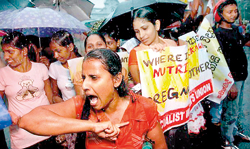Reply To:
Name - Reply Comment
Last Updated : 2024-04-19 09:49:00
_City-DM-8-3.jpg) framework of a democratic polity, laws, development policies, national plans and programmes in the last two decades, both the State and women have continuously aimed at women’s advancement in different spheres. The approach has been both positive and negative.
framework of a democratic polity, laws, development policies, national plans and programmes in the last two decades, both the State and women have continuously aimed at women’s advancement in different spheres. The approach has been both positive and negative. Lumping women with the less-abled or the reference to “Nothing….shall
Lumping women with the less-abled or the reference to “Nothing….shall_City-DM-8-1.jpg)
_City-DM-8-2.jpg) The only structures that held weight to protect women against gender disparity and other concerns was the power of the executive arm in the form of a Ministry of Women’s Affairs, the National Committee for Women, (not enacted) Violence Act, the Child Protection Authority, amendments to the Penal Code and other supportive legislation. However complementing the above measures during the war period was the rural women’s informal activities from the Women’s Bureaus and a widespread network of Non-Government Organisations that had a strong grassroots presence and progressive insight to women’s concerns.
The only structures that held weight to protect women against gender disparity and other concerns was the power of the executive arm in the form of a Ministry of Women’s Affairs, the National Committee for Women, (not enacted) Violence Act, the Child Protection Authority, amendments to the Penal Code and other supportive legislation. However complementing the above measures during the war period was the rural women’s informal activities from the Women’s Bureaus and a widespread network of Non-Government Organisations that had a strong grassroots presence and progressive insight to women’s concerns.
Add comment
Comments will be edited (grammar, spelling and slang) and authorized at the discretion of Daily Mirror online. The website also has the right not to publish selected comments.
Reply To:
Name - Reply Comment
On March 26, a couple arriving from Thailand was arrested with 88 live animal
According to villagers from Naula-Moragolla out of 105 families 80 can afford
Is the situation in Sri Lanka so grim that locals harbour hope that they coul
A recent post on social media revealed that three purple-faced langurs near t

10 Apr 2024
09 Apr 2024